Extension of the Model UN Conference Program
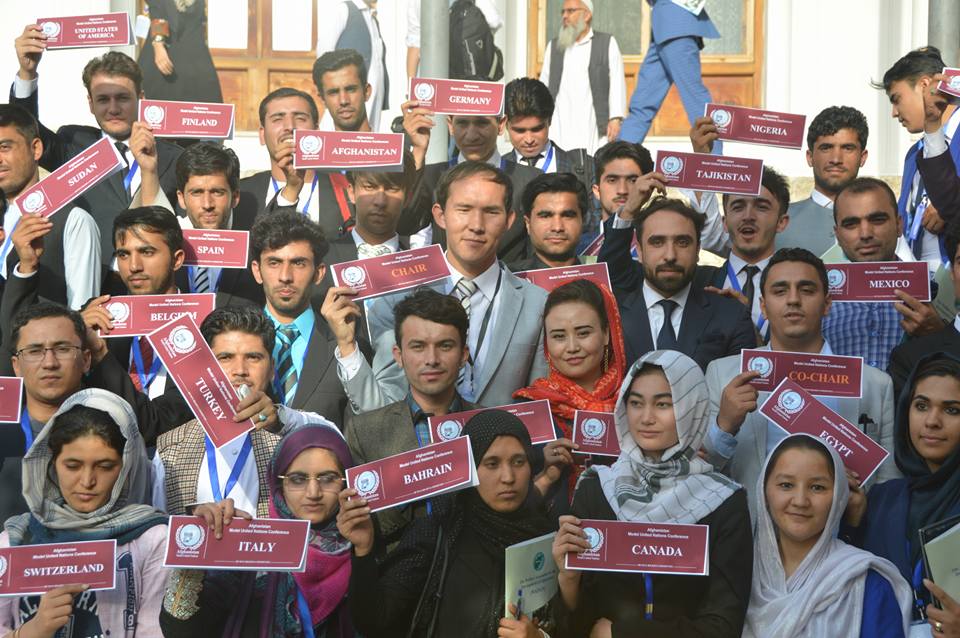
With financial support from the United States Embassy in Kabul, WADAN successfully implemented the Model United Nations (MUN) Project in collaboration with state and non-state institutions in Afghanistan. The project lasted for one year and was completed on September 14, 2017.
The project enhanced the capacity of 125 eligible students selected from Law and Political Sciences, and Journalism Faculties of universities and institutes of higher education in Balkh, Herat, Kandahar, Nangarhar and Parwan Provinces. Students worked intensively to learn public speaking, debating, critical thinking, conflict resolution, leadership, communication, and the English language.
On August 23, 2017 the students acted as delegates to the Model UN Conference conducted in Kabul representing the countries assigned to them. Student-delegates were assigned to the General Assembly, Human Rights Committee, or Security Council. Once gathered they debated “Child Trafficking in the World” in the General Assembly, “Violence Against Women” in the Human Rights Committee, and “The Security Situation in Syria” in the Security Council.
Due to the success of the full year of activities and the well-informed, lively, gender-balanced and interesting Model UN Conference the US Embassy will support the Model UN program in state and non-state universities in Bamyan, Khost, Badakhshan, Helmand, and Laghman Provinces. In this project 120 eligible students will participate between September 15, 2017 and September 18, 2018.
Now we have access to education in the heart of our village
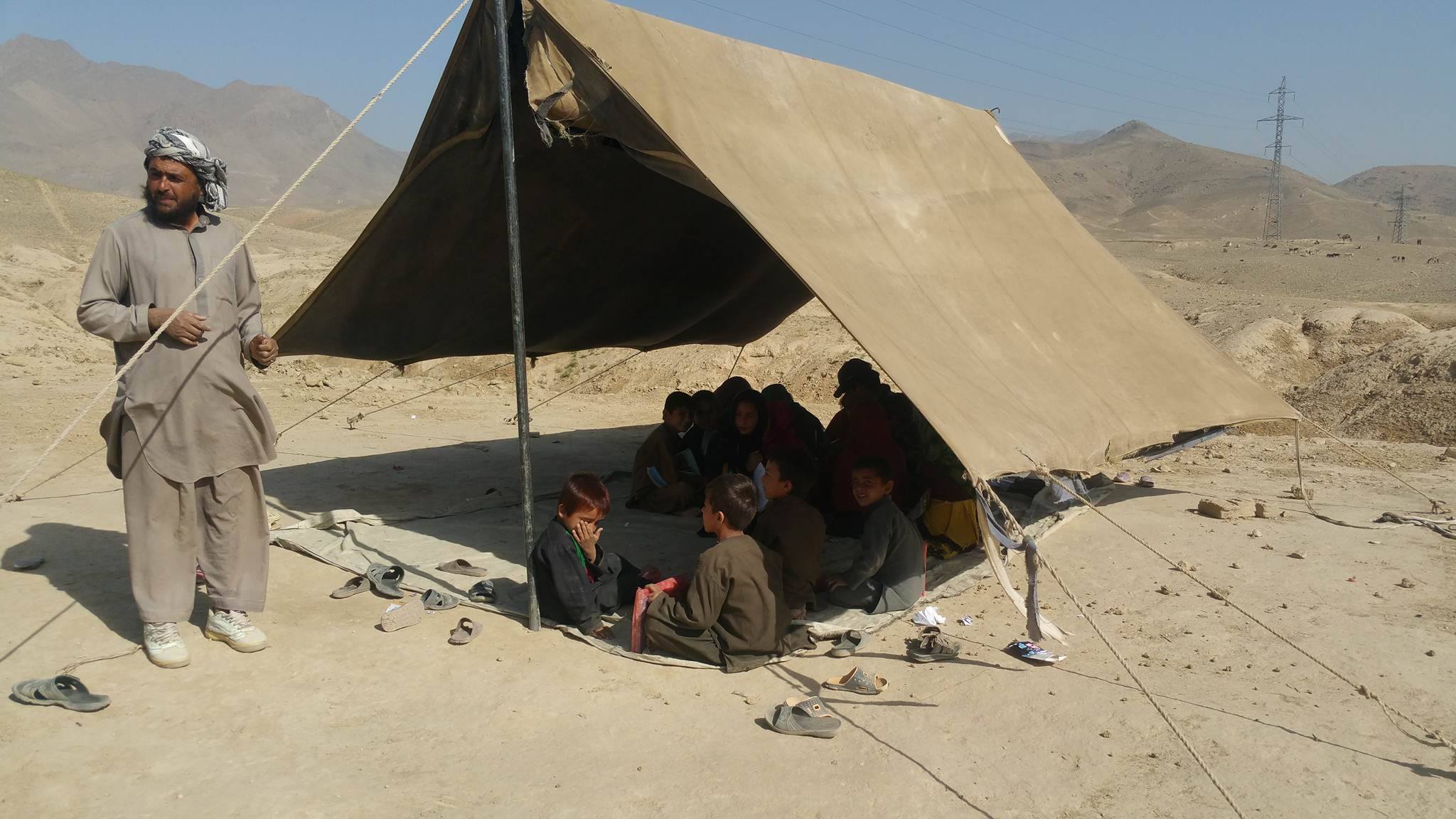
With support from the World Bank, WADAN successfully implements the Afghan-government project Targeting the Ultra-Poor Project (TUP) in Khak-e-Jabar, Dehsabz, Chahar Asyab, Musehi, and Qarabagh Districts of Kabul Province.
WADAN-TUP works to identify the neediest families in a community and assist them in the four sectors of Livestock, Health, Social, and Livelihood. The goal is to reduce the vulnerability and improve the livelihood, income, food security and nutritional status of ultra-poor and vulnerable rural households on a sustainable basis. This project will strengthen coordination between Afghan government and the citizens.
Most villagers in Wali Khail Village suffer from poverty and a lack of educational facilities. The village, located in a remote area of Khak-e-Jabar District, lacks schools and other facilities. Children have no access to education in their village and the adults walk miles to attend school and continue their education. A school to provide primary education to the children has been a vital need of the residents
Through the TUP Program WADAN identified the ultra-poor families in Wali Khail and distributed a milk cow to each. Coordination meetings are regularly conducted with community elders, Mullahs and Maliks to strengthen their relations with the Afghan government and help them work with ultra-poor families to solve their health, social, and livelihood problems. Through these meetings WADAN has encouraged the village leaders to request education and other facilities from their local government.
Khak-e-Jabar’s community elders and Maliks have strongly requested the district officials open a nine-month school for the children in their village. Malik Toor Muhammad said, “WADAN’s program organizers have strengthened our relations
Twenty students of this class belong to TUP beneficiaries. Ms. Saera, a TUP beneficiary in Wali Khail Village said, “Now my daughters have schoolbooks, a teacher, and a class in the heart of our village. It seemed unbelievable or impossible in this isolated desert area to seek knowledge. This tent may not have high value, but we are sure that it will be replaced by a large village school. This class will teach our children that seeking knowledge will improve our future and encourage people regardless of their age to get education.”
Targeting the Ultra Poor
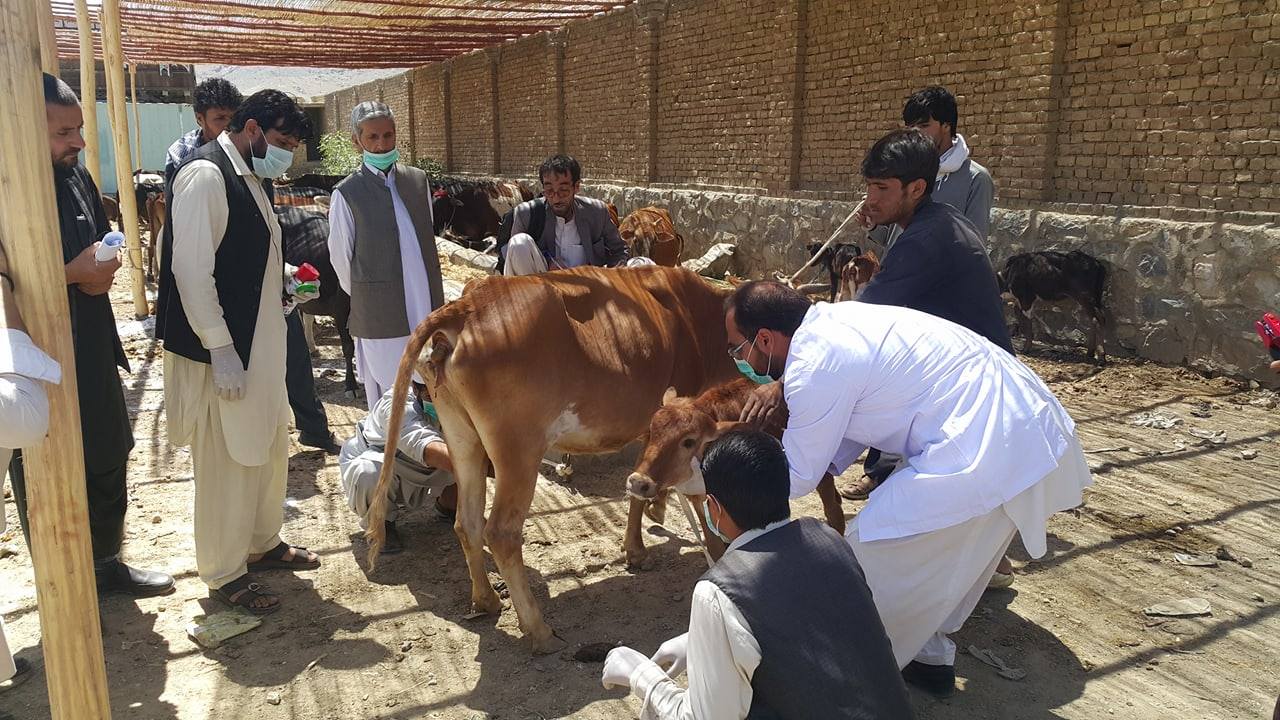
MISFA and WADAN work to improve the lives of marginalized and ultra-poor families through providing the ways and means for them to become self-sufficient and prosperous socially and economically through Targeting the Ultra Poor (TUP) Program projects in selected provinces.
On July 30th and 31st 2017 the project closure ceremonies in Kunar and Laghman Provinces were well attended by local government authorities, Maliks, Mullahs, the media, and project participants. In the July WADAN signed Memorandum of Understandings with the District Development Assemblies (DDAs) and Community Development Councils (CDCs) of the participating districts in Laghman and Kunar Provinces intended to ensure follow-up the growth process of the TUP participants in their progress for further improvements in their lives. The Assemblies and Councils will further work to build former TUP participants’ ties with their communities and the social services provided locally by the Afghan government. Since TUP participants have risen from being social outcasts stigmatized by extreme poverty and social ineptitude, they require kind attention from concerned citizens to bolster confidence and ensure long lasting inclusion in community affairs.
WADAN now implements TUP in Kandahar and Kabul Provinces. These projects started November 01, 2016 and will continue through October 31, 2019. TUP is an Afghan government program that aims to strengthen state to citizens’ relations through providing primarily female-headed households with the ability to become food secure and financially solvent. In Kabul there are 1,500 participants and 1,000 in Kandahar will gain necessary skills in the health, livelihood, social and livestock sectors. The productive livestock component, for example calf-producing milk cows, and the monthly stipends beneficiaries receive will enable them to start business enterprises. They will also participate in literacy education and be encouraged to send their children to school rather than to work to contribute to the family’s income. TUP also provides financial education – banking fundamentals like how to open and maintain savings accounts.
The selection of ultra-poor families who would be included in TUP was conducted through what is called Participatory Rural Appraisal (PRA). Several household visits were conducted in the five participating Kabul Province districts of Chahar Asyab, Qarabagh, Dehsabz, Khak-e-Jabbar and Musehi and in the three participating districts in Kandahar Province: Spin Boldak, Dand and the Kandahar City.
In June 2017, WADAN began the three-month procurement and distribution process of animals in both provinces. An assets selection committee comprised of skilled veterinarians from the Directorate of Agriculture, Irrigation and Livestock and those employed by WADAN as well as other project employees was formed. Committee members must examine and select the cows, goats, and sheep based on strictly set criteria before purchasing them for delivery to the districts and distribution to the beneficiaries.
Also, WADAN conducted several trainings for TUP participants to teach them ways of increasing their assets’ products and to improve their lives through starting small and village-based businesses. For this purpose, in the upcoming two years, our TUP team will regularly pay several household visits sharing with people important messages regarding their livestock and livelihood, health and overall financial welfare, and the value of life-long education.
Lastly, WADAN successfully implemented TUP in three districts of Nangarhar Province: Surkhroad, Kama, and Behsood. This project started August 04, 2019 and continued through June 30, 2021. In 2021, WADAN mainly focused on linkages to social, livelihood, livestock, and healthcare services. During this time, 2,980 rural households were linked with these services in the participating districts while 80 families with different expertise were identified as urban TUP participants in Jalalabad City. In total, 3,060 ultra-poor households received two-year packages of assistance; they have been trained on financial literacy, social mobilization and integration, livelihood improvement, and hygiene. In addition, due to the timing of the pandemic, WADAN initiated campaigns in the target communities to control the spread of COVID-19.
This project focused specifically on ultra-poor households who would benefit most from the package of support, including access to financial services, to help these people develop sustainable livelihoods. Its purpose was primarily to provide ultra-poor women the necessary skills and assets, while in a safety net program, to develop self-sustaining income-generating activities; and establish links between them and microfinance institutions and/or savings groups before they “graduated” from the program. As a pilot project, WADAN covered four Nahias (districts) in Jalalabad City, the First, Third, Seventh, and Eighth Nahias. These included 80 households whose family members possessed differing skills. By the end of the project, participants were earning enough money to meet their daily expenses.
In total, 1,114 households in Kama, 973 in Behsood, 973 in Surkhroad, and 80 households in the urban areas are introduced to the TUP program. According to the statistics after the final graduation that took place in June 2021, 90% of the households graduated, which means they attained socially and financially improved lives and their incomes and social standing became sustainable.
Sustainability was an integral part of the objectives of this project, after two years of assistance and participation, all the beneficiaries were handed over to the relevant district administrations, community development councils (CDCs), and to Jalalabad municipality social services staff for monitoring to ensure that they would take care of any reproductive assets and maintain the financial and social objectives they had reached during the project’s lifespan. According to the memorandum of understandings (MoUs) signed with these entities, they have agreed to keep close and effective communication and coordination with the beneficiaries to help keep them on track.
Marjan: a Woman in Recovery
War, poverty, and illiteracy have adversely affected every Afghan family. Rural areas suffer deeply from widespread drug addiction and yet receive the least attention.
Marjan, aged 32, was born into a poor family in a remote village; she became an accomplished carpet weaver but her personal story is heartbreaking. Married off at age 14, she became a mother three years later. Marjan wove carpets full time for income, a job she found tedious and physically demanding. She was responsible for the care of her husband and children and the family’s animals. These responsibilities were difficult to manage, especially after the birth of her second child.
Noticing her suffering, neighbor women encouraged Marjan to use opium and instructed her to blow smoke into her baby’s face to silence the child so she could work more efficiently. Unaware of the consequences, she began using opium and continued to use it to help her sleep and for pain control. By the time she learned about the consequences of opium use it was too late. She had lost her health and her ability to work. Since she continuously needed opium in larger amounts the financial status of her family suffered.
After fifteen years of addiction, she lost everything as finally her husband forced her to return to her parents. Then Marjan’s father desperately began a search for treatment for his daughter. He learned about WADAN and brought her to the treatment center. Initially, Marjan was devastated. She thought of nothing except drugs. Once treatment began, she began to consider positive change.
For Marjan, societal abuse and stigma was a terrible experience; a barrier to her recovery and ability to think about change. She states emphatically that opium farmers and drug suppliers are enemies of society and action should be taken against them.
In Ramadan 2017, Marjan was discharged from the center. She anticipates a healthy life and hopes to return to her husband. While drug use took away her joy, she hopes now to enjoy life, to take care of her children and help them mature into good people.
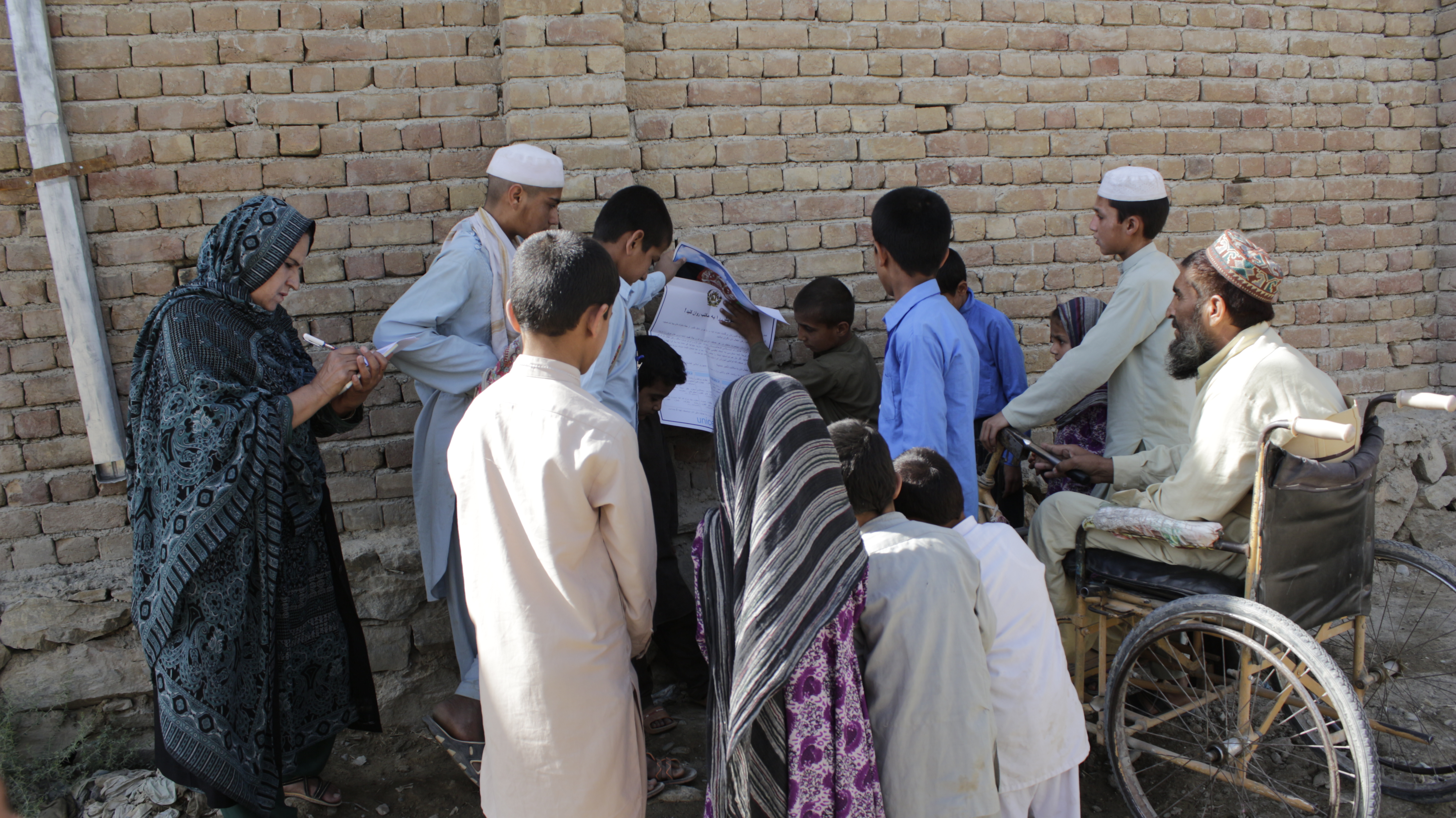
WADAN signed a partnership agreement with The United Nations Children’s Fund (UNICEF) in Kabul on April 17, 2017 to implement the Back to Learning (BTL) project. This UNICEF-funded awareness creation campaign; implemented in Kabul, Kandahar and Nangarhar Provinces ending on October 16, 2017, with a goal is to facilitate access to learning at local educational facilities for the children of 10,000 returnees and internally displaced people (IDP) as well as other out-of-school children. Under this project, WADAN will cover Dehsabz and the metropolitan area in Kabul, Punjwaye and provincial municipal areas in Kandahar, and Surkhroad, Behsood, Kama, Rodat and provincial municipal areas in Nangarhar.
To achieve this goal, WADAN will spread information and convey messages focused on encouraging school enrollment in the zero points (border areas between Pakistan and Afghanistan), and at UNCHR Encashment Centers where UNHCR distributes stipends to returning Afghans. These campaigns will be conducted in the communities where the returnees settle. Dedicated radio clips on enrolling children in classes will be produced and then broadcast on local radio outlets to mobilize the returnees, IDPs and local communities. During the project, BTL staff will design, produce, and distribute brochures, leaflets, and posters describing and addressing the importance of education and schooling of all children in Afghanistan. These printed materials will be distributed at the encashment centers and the posters put up in villages, bazaars, in front of mosques, and other public places in the participating districts.
WADAN implements this project in close collaboration and coordination with the Ministry of Education, Department of School Management Shuras, their provincial and district level departments, local School Management Shuras as well as the UNICEF, UNHCR and International Organization for Migration (IOM) zonal offices, and other relevant government and civil society institutions.
WADAN Promotes Social and Political Accountability
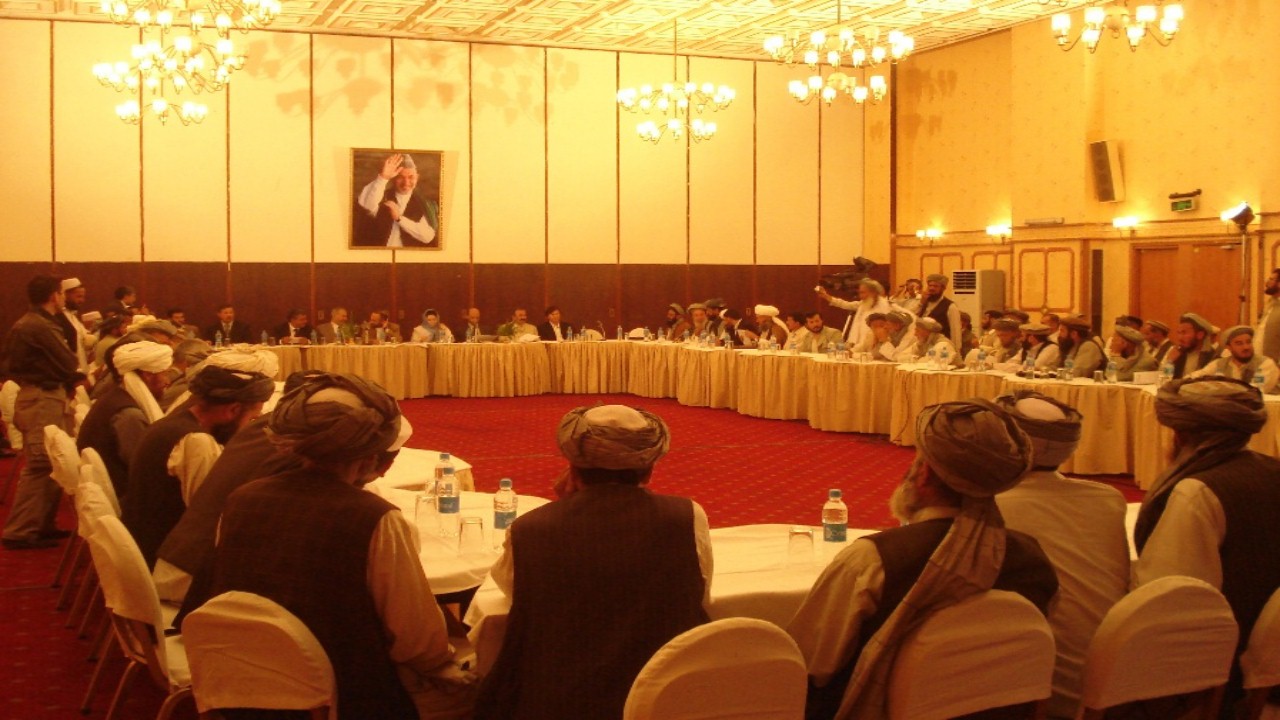
Community elders discussing regional problems and solutions at the WADAN-NMA General Assembly in Kabul in 2007
When there are on-going active social accountability practices from the community level up, people are involved in discussing policies and plans, budgets and expenditures, delivery of services and other important socioeconomic, and political aspects. Without an active citizenry the culture of corruption prevails.
Since its establishment in 2002, WADAN has delivered many programs to encourage social and political accountability through engaging the traditionally most influential people at the grassroots, the Maliks who are the civic leaders, and the Mullahs who are the faces of religion that is the center point of village life. Through a program that supported the propagation of political transparency and socio-political accountability, WADAN encouraged the establishment of the National Malik’s Association (NMA) in 2005. 60,000 Malik’s are trained in human rights, citizen’s responsibilities, peace and justice the NMA supports citizens and advocates for their rights. These bridges are built through workshops and training on peace and justice, effective leadership, social mobilization, anti-corruption, transparency, and social accountability.
WADAN has conducted numerous town hall meetings, focus group discussions, and conferences at the national, regional and community levels that provided opportunities for Maliks, Mullahs, women and youth to have face-to-face discussions with government authorities to request their rights and to participate in the fight against corruption.
As an example, receiving a national ID or Tazkera is the right of every Afghan. However, the long and complicated process to get a Tazkera is problematic for most people and this has caused a breech between the government and citizens. In Nangarhar Province, to encourage citizens to apply for a Tazkera and to simplify the process, WADAN produced radio messages that were broadcast by local stations, put on billboards, and printed in booklets that were widely distributed. WADAN facilitated the installation of a complaint box in the Nangarhar Provincial Population Directorate that provides an easily accessible opportunity for people to submit their concerns and report bribes and corruption issues. A committee comprised of several civil society organizations, various provincial directorates, and locally influential people were hired to assess the complaints and respond to the issues.
Another of WADAN’s approaches in promoting social accountability and transparency was to organize and conduct live radio programs and televised panel discussions hosting community elders and religious scholars, who took questions directly from their audiences. In a society where literacy is low, this kind of programming helps people understand their legal rights and responsibilities, promotes good governance and helps government officials and community authorities understand people’s problems by openly addressing the underlying issues related to developing a prosperous community
TUP-WADAN has created an idea of saving and through this, I have made a cheese to sell in the market and wish to enhance this business.

With support from the World Bank through MISFA, the Welfare Association for the Development of Afghanistan (WADAN) implements the Targeting Ultra Poor Project (TUP) in Mehtarlam, Qarghayee, Alishing and Alingar Districts of Laghman Province.
The TUP-WADAN team worked to identify the socioeconomically most vulnerable families and the program is designed to assist them to succeed using Livestock, Health, Social and Livelihood as the vehicles of positive change. TUP seeks to improve lives through livelihood, educating the children, food security and improved nutrition and healthcare on a sustainable basis.
Farooq is a resident of Qala-e-Mahbas Village in Mehtarlam District. He was a laborer and lost his three brothers and one son in the war. He was the only one earning money for food for his family that includes his nephew and nieces.
According to Farooq last year WADAN started the TUP project asking all community members to participate in the Participatory Rural Appraisal (PRA). The community elders introduced us to the WADAN as ultra-poor in the PRA. The WADAN-TUP team visited our house several times and I was selected as a beneficiary at first stage. In the second stage I was successfully selected in the lottery.
The team provided a productive cow and a 1,000 Afghani monthly stipend for livestock feed. They have also provided regular training on health and hygiene, livestock care, living within community, livelihood and saving money for the future.
The provincial TUP team trained us about how to keep the livestock and encouraged me to start saving income from selling the milk, yogurt, and cheese. My monthly savings are about 2,200 to 2,800 Afghanis. I have also become able to enrolled one daughter and one son in school.
Through TUP Farooq has become independent and self-sufficient. He is happy the TUP project has been implemented in his district as it directly helps poor people.
